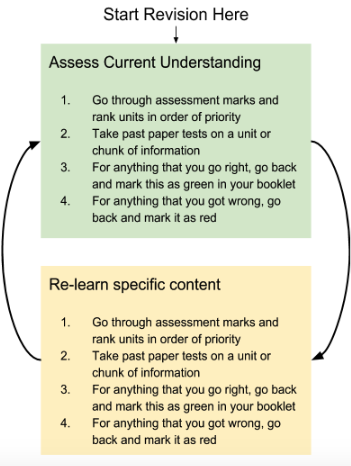This post is designed to give parents and students a really brief insight into some practical strategies that might improve learning and make time spent on it more effective.
It is split into two parts. Part 1 looks at a how you might get started with revision and what the cycle of revision certain content might look like. Part 2 looks at some principles of effective learning. They are very general at this point. Part 3 suggests some further reading for students and parents who are interested. There are also some links to further strategies that might also be useful.
The post is designed to act as a starting point for parents and students to look more into effective learning and what it might look like for them.
Plenty of students work really hard. However, many don’t know how to learn, revise and study effectively. Many think that just reading their notes is good enough. This often lulls them into a false sense of security. “I’ve read everything, so therefore I have revised.” However, research suggests that this is a really ineffective use of time in terms of embedding things into the long term memory.
Hopefully, this section gives students an insight into how they might organise their time so that they spend more of it looking at content they don’t know yet, and then use strategies that are the most effective use of their time.
Assess Current Understanding
Re-learn specific content
The diagram below represents this in a more visual way. (note, this is an example of dual coding - see part 2).

A graphic organiser that suggests how students might navigate entering the revision cycle (this is also an example of dual coding)
Research suggests certain principles that might make learning more effective. There is no one magic bullet for learning.
The main takeaway though is that just reading through notes is not effective. Neither is just re-writing notes again and again.
Below is a table of some principles, with a short explanation and then some potential strategies. The list is by no means exhaustive, but all of the principles should be incorporated into a revision strategy in some way. Students are encouraged to be inventive with how they put these principles into practice.
| Principle | Explanation | Some Potential Strategies |
| Retrieval Practice | Research suggests that regularly trying to retrieve content from your memory helps embed knowledge and understanding into your long term memory. It is important to note that this can be demoralising as students discover what they don’t know. It is important to approach this with the right mindset! |
|
| Dual Coding | Research suggests both verbal and non-verbal processing are important in making connections in learning. Drawing diagrams helps you to make connections that you might not make when writing/saying and vice versa. |
|
| Spaced Practice | Research suggests that spacing learning over time is more effective in terms of storing knowledge and understanding in our long term memory. This means regular periods of revision starting now, rather than cramming during study leave. |
|
Further reading
I am immediate amazed at how little of this post I was aware of. I don't think I could actually give an articulate response to 'How do learners learn?'. Maybe we get so caught up in the day to day teaching that we rarely step outside the box and identify what research actually says about learning!
Yes, me too! The issue some find with this type of stuff is that: is it learning for exams? I don't think it is, it's just that a lot of the research (or where it is applied) is done in areas where success in exams is what we measure...
I see incredible overlaps with CBTL and if anything, enacting these principles just improves my classroom practice. One thing Stuart reminded me of though, is that there is a difference between success in school and success in life. So I think these things are really important, but we must also remember about the transferal of knowledge etc that CBTL promotes so well...